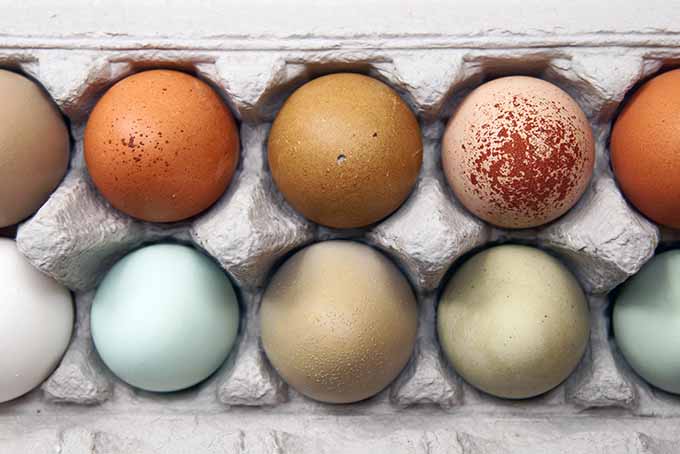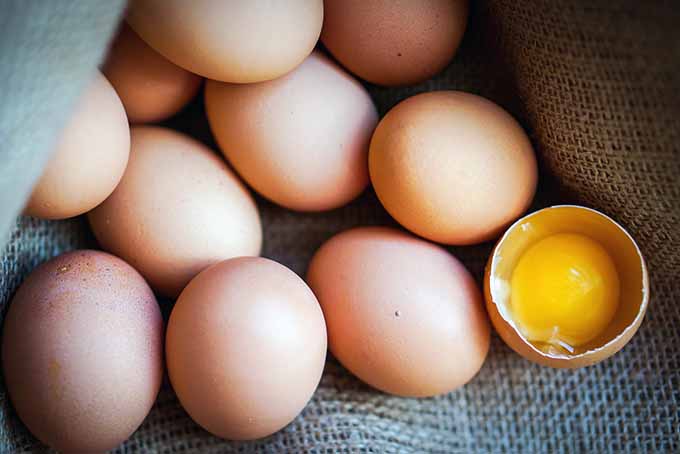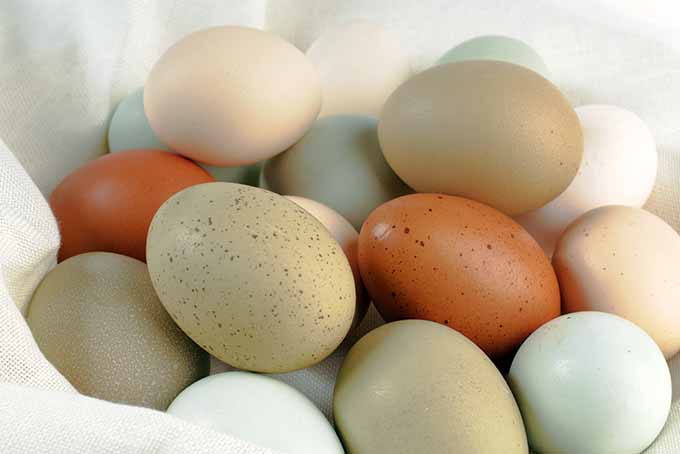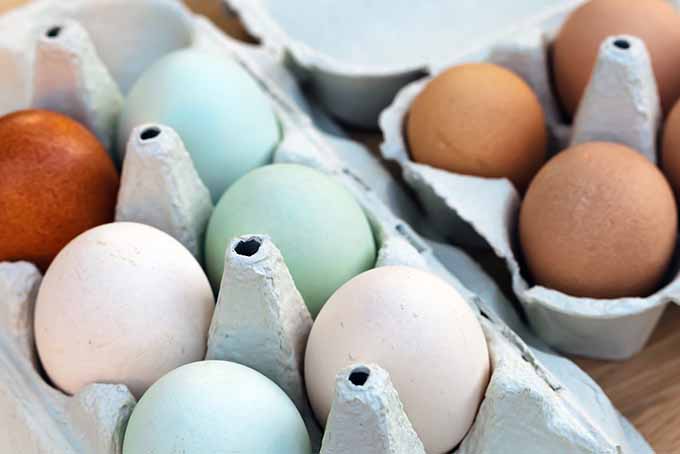Eggs are an enigmatic lot.
First, there’s the question about who begat whom, the egg or the chicken. Then there’s the cryptic coding and murky descriptions on the cartons they come in.
Next, there’s those pastel and jewel-toned ones – even before they’ve been dyed for Easter!

Follow this up with the ever-changing information about eggs, cholesterol, and heart disease. They were good for us, then they were bad, then kind of good…
And of course, there’s the issue of brown ones being “better” than white ones.
While the question remains about which came first, we have determined which color rules the roost, and outline some surprising new information about dietary recommendations for these protein powerhouses.
Are Brown Eggs Really More Nutritious?
In a word, no – there is no chicken egg that’s superior to another in any way.
That’s worth repeating: brown eggs are not a more nutritious selection.
According to the University of Illinois’ Incubation and Embryology extension program, regardless of their color, all eggs contain equivalent nutrients when hens are fed a similar diet. And, they’ll also have the same flavor, shelf life, and cooking characteristics.

The reason for different shell colors is that different chicken breeds lay eggs of different colors. All shells start out white, but as they pass through a hen’s oviduct, pigment is deposited on the outside.
For example, Ameraucana birds from South America produce blue, green, and teal colors. French Marans lay copper, brick, and dark chocolate colored gems. Easter Eggers, not a true breed but a cross, create rose, blue, and olive colored shells.
And the most common laying hen in the U.S. produces the white variety – the Single Comb White Leghorn, immortalized by the blustery Looney Tunes character, Foghorn Leghorn.
You know, “Lookit here son, ah say son, did ya see that hawk after those hens? He scared ’em! That Rhode Island Red turned white. Then blue. Rhode Island. Red, white, and blue. That’s a joke, son!” That Foghorn Leghorn!
But What About the Yolk Color?
Don’t brown eggs have a deeper, sunshine-yellow color that beams healthy nutrition?
Well, they may. But it’s not due to shell color. It’s because of what the hens eat.
Chickens fed a diet of wheat or barley have pale yolks. Yellow corn and alfalfa meal produce medium-yellow yolks, and chickens that have access to plants rich in xanthophyll will have deep yellow yolks.

Xanthophyll is a type of chlorophyll with yellow and orange pigments that are absorbed by the chicken in their diets, and this results in a more robustly colored yolk. This is why some farmers supplement their hens’ diets with marigold petals, which are rich in xanthophyll.
So, if the nutritional value is the same, and yolk color is only due to diet, why are brown ones often more expensive?
Typically, the breeds of chickens that lay the brown shades are larger and heavier than those that lay white ones. This means they require more feed, making them more expensive to produce. And if their diet is supplemented with xanthophyll-rich products for more colorful yolks, that too is an added expense.
Excited to add some eggs to your own diet? Check out this recipe for eggs benedict, or our suggestions for using up that stash of Easter eggs after the holiday. Or use them in our delicious, healthier version of breaded beef fillets.
Love aioli? Make it fresh in our recipe for carrot raisin salad with lemon aioli.
Fertile vs. Infertile
Another concept that’s been gaining ground is that fertile ones are more nutritious than unfertilized eggs.
This idea has become popular among advocates of both paleo and raw food diets, but the science doesn’t support this claim.

A report by authors Jacqueline Jacob and Richard Miles of the University of Florida’s Institute of Food and Agricultural Sciences states that there is no nutritional difference between them. Both are safe to eat, and most eggs available in grocery stores are infertile, as hens don’t need to have a rooster around to lay.
What About Cholesterol?
In 2015, the U.S. Office of Disease Prevention and Health Promotion (ODPHP) published the 2015-2020 edition of their Dietary Guidelines for Americans.
In a turnaround from previous guidelines that recommended limiting cholesterol intake to no more than 300 milligrams per day, the Guidelines did away with this recommendation.
Why? The Guidelines explain: “Because available evidence shows no appreciable relationship between consumption of dietary cholesterol and serum cholesterol… Cholesterol is not a nutrient of concern for overconsumption.”

In other words, it has not been proven that eating foods high in cholesterol directly causes high blood cholesterol, or that consuming eggs definitively contributes directly to the onset of heart disease.
Eggs are back in favor, when consumed in moderation – one per day is the recommended allowance.
And that’s good news, because they’re are a complete protein, as well as a good source of vitamins, minerals, and other essential nutrients.
Conclusion
Clearly, eggs have been misunderstood.
But now that a few of the more common misconceptions have been cleared up, will it change your eating patterns, or inspire you to try new recipes?
Will you be inclined to enjoy their excellent nutritional value more often, or will you wait and see what the next round of research reveals?
Let us know your thoughts in the comments below!
The staff at Foodal are not medical professionals and this article should not be construed as medical advice. Foodal and Ask the Experts, LLC assume no liability for the use or misuse of the material presented above. Always consult with a medical professional before changing your diet or using supplements or manufactured or natural medications.
Photo credits: Shutterstock.
About Lorna Kring
Recently retired as a costume specialist in the TV and film industry, Lorna now enjoys blogging on contemporary lifestyle themes. A bit daft about the garden, she’s particularly obsessed with organic tomatoes and herbs, and delights in breaking bread with family and friends.




Fantastic article. I have to admit to being guilty of buying the brown variety because I thought they were better for me. I grew up with chickens (Rhode Island reds!) and they had brown ones. We’d coop the chickens at night, but let them wander the property during the day. Those were some tasty eggs! When you could find them…
Is there anything science-wise on the difference between the eggs of free-range chickens that actually get to run around and eat bugs and grass (and flowers, and dirt and…) as opposed to “cage free” chickens, or even regular farm chickens?
I haven’t been able to find any studies that report free-range as being different in nutrition. Although with many casual taste tests, the free-range ones almost always come out on top for a better flavor… as you know from your own Rhode Island Reds!
When it comes to flavor, the difference is in the diet. But personally, I can’t help but think that chickens who get do to their chicken thing instead of being cooped up in a cage would be ‘happier’, and produce more nutritious and better tasting eggs – we know what stress does to our bodies, and animals can get stressed too. But that’s just my opinion… although I think it would make a fascinating study.
Thanks for your question Quininejack, and glad you enjoyed the post!
Hi Lorna! Thanks for writing this post. I love eggs, and I am glad to see some common myths about them dispelled.
I used to live on a ranch, so we raised our own chickens. We gave them feed, but we also allowed them to roam in the garden; they did a pretty good job of keeping the grasshoppers out of the garden.
To this day, I think farm-fresh eggs taste the best. I also prefer farm-fresh because I live in an area that has a lot of chicken and turkey farms, so I have seen the conditions that those birds live in. It is especially tough because I know how my sister and I cared for them when we were kids; we even named some of the high-producing hens.
On a brighter note, I came up with a great idea on how to use up those Easter eggs. On the Monday after Easter, make up a big batch of deviled eggs to take with you to work. This is particularly effective if you have some young college students at your work place; most of them do not usually have access to home cooked food, and they will be more than happy to relieve you of some of those eggs.
You could also donate the hard boiled eggs to a local soup kitchen. I am sure that the folks there can figure out a way to put them to good use.
There’s nothing like farm fresh eggs, my grandparents had a farm and I remember eating lots of these growing up. I’m glad that many communities are allowing backyard chickens, my dad took advantage of being able to raise chickens and he would always send my sister and I many cartons of eggs. My dad has moved out of state now, but I just recently found out a few of my neighbors have chickens now.
It’s hard to beat farm fresh CS, particularly when the hens can range as well – they’re great for insect control in the garden!
And I love your ideas for using up the Easter leftovers! Sharing them with others is an awesome gift, and makes them taste even better! Glad you enjoyed the post…
Good solid article. I was aware of most of this already, but it was nice to read an article on the matter that was accurate and complete with good sources. I like it when there is science referenced to back an article up.
Thanks nytegeek. With all the opinions, myths, and fantasies that float around online, a few facts can be a nice change of pace! It’s certainly a high-priority here on the Foodal site. Glad you liked the post!
When I was young, me and my grandma would make what was called ‘pace eggs’ for Easter, which are hard-boiled eggs dyed with tea bags. I had completely forgotten about it until I saw this post, so thank you for sharing and jogging my memory about this.
That’s awesome – I remember dying Easter eggs with tea bags one year when my Gran was visiting from Scotland, so thank you for the shared memories!
Wow, great post! I had no idea there were so many intricacies when it came to various types of eggs. I knew about the deep yellow yolks being better, but I didn’t know why, or that farmers sometimes supplement to get that color. Very informative post!
I don’t think too many of us that stop to ponder the egg mystique when we’re picking up a dozen at the grocery store Ssw! But there certainly is a lot that goes on behind the scenes… glad you found the post to be information.
I feel like I hear something new about my eggs every time that I read the news or get online, so I am really not sure what to believe anymore. I have heard that brown is better, and then they were not better, and then yolks are bad, and then yolks are good, whites only…it goes on and on. I just stick to what looks good to me.
In the final analysis, what’s appealing and makes you feel the best is probably the best criteria rz3300! Thanks for your comments.
I have mixed feelings about eggs. I love scrambled and omelettes, but boiled or fried are not my thing, even though I used to love them as a kid. I usually buy brown shelled varieties, but not because of the nutrients they may or may not contain – they are just cheaper here. Although I’m glad to hear that no color is superior. The cholesterol is another controversial issue – some say it’s bad for your, others claim that you can consume a certain amount safely. However, I think that everything is good in moderation so a few eggs a week most certainly won’t be bad for your health.
I think you’ve hit the key for well-being in just about any area Cilivren, “good in moderation”! Thanks for your comments.
I was happy to see this article over to the side of your blog because I’ve been wondering for a while now what the difference between the colors are, and now I know… nothing! I also wanna thank you for putting some information here on how eggs aren’t as bad for you as most people seem to claim. They’re actually very healthy and nutritious when not smothered in grease in cheese, but people have a bad view of them for some reason or another and I’ve been trying to persuade folks that they are great for your body.
They’re very healthy and nutritious on their own kdb890! And as Cilivren pointed out, moderation is the key… Glad you enjoyed the post.
As I was reading your article I was laughing a little. After everything we have heard from the FDA about their research and controlling every aspect of our food from seed to store. I learned at an early age that they didn’t know what they were talking about but they did have me fooled about the eggs though. Thank you for opening my eyes to see this so I don’t get pulled in like others. To be honest I have never bought the brown variety before but I always wondered if they were actually better. Thank you for this and look forward to more of your entries.
Glad you enjoyed the post rmd1982, and thanks for your comments.
Very informative! I have never cared much for the research regarding eggs so I really like this article. I definitely have never been able to taste or tell a difference in yolks. I have lots of friends who have chickens and am always able to get farm fresh eggs and I will say, nothing beats that! That is a taste you can notice!
Lucky you to have a source of farm fresh ones Charlotte, they’re the best in my books! Glad you enjoyed the post.
I’ve known for a long time that eggs are nutritionally beneficial and not as unhealthy as the ‘experts’ would have us believe. My favorite type are actually duck eggs which, in my opinion, have a richer flavor. When I was raising chickens we had every color ‘hen fruits’ imaginable and they all tasted the same, so this information is something that farmers have been aware of for eons. It’s great that the information is finally getting out there to the rest of the world though.
Farmers are a pretty savvy bunch novelangel. But marketers will take the “unique color” slant and squeeze a few extra pennies out of an idea if they can! With consumers none the wiser… thanks for your insights.
I knew it! A lot of people are always telling how different eggs are depending on their color, but at the end of the day, I think that this color can be compared to the one of human skin or hair, at the end of the day it doesn’t really mean anything, it’s just pigment.
And I don’t think that I will necessarily change my eating habits since I don’t really take in count the color of the eggs, so is not a problem for me at all.
Thank you so much for sharing! 🙂
Just pigment indeed anorexorcist, and only shell-deep. Thanks for your comments!
I do have to say, I have never seen blue shelled eggs in my local grocery store. I have seen the tan colored, white, and darker brown ones, and I always seem to buy the white ones. I have always thought that eggs are all the same, basically. I will have to buy a carton of the brown ones and see if they taste as good as people rave about. I just buy the basic white carton, since they are cheap, usually about $1.25/dozen right now.
If you’re going to give brown eggs a try Ashley, try farm fresh instead of grocery store ones – that’s where the real flavor difference is.
I cannot say that I am surprised to see that there is really no difference. It just makes sense that after hearing everything from all angles throughout my life, the first scientific thing to come out says…..it doesn’t matter. Nice little anecdote for a lot of the health advice that is out there, so you just have to be careful with what you believe.
Very true rz, a little grain of salt goes a long way in keeping us safe from misinformation!
There really has been a lot of misconceptions about the eggs, and this article has really cleared it up for me. Thanks for sharing this knowledge. All I’ve read in the past made eggs seem to be something that I should avoid with a passion, but after reading this, I’m sure I’ll enjoy my egg breakfasts for a long time yet.
They’ve certainly been one of the most controversial foods, health wise. But, like anything, best enjoyed in moderation… glad you enjoyed the post!